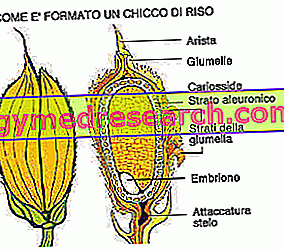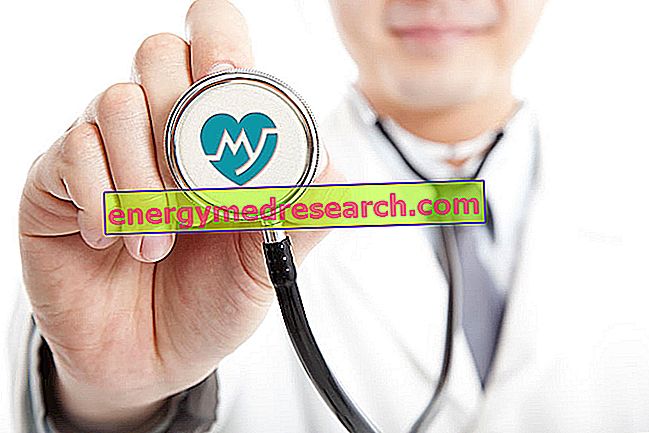Generality
Hypertensive heart disease is a disease affecting the heart, which results from a persistent increase in blood pressure.

Arterial hypertension causes, in fact, a work overload that leads to muscle exhaustion . This process subjects the heart muscle and the blood vessels that are connected to it to a series of alterations in structure, mechanics and function.
In mild forms of hypertensive heart disease, the symptoms are not very evident; when they appear, the most common ailments include difficulty breathing and wheezing (dyspnea), a sense of continuous tiredness (asthenia), swelling of the ankles and legs, chest pain and tachycardia. Over time, if it is neglected or not treated properly, hypertensive heart disease can cause serious and potentially fatal complications, such as heart attack and heart failure .
What's this
Arterial hypertension: preliminary notions
- Hypertension is defined clinically when the increase in the values of systolic and / or diastolic arterial pressure, measured at rest, is prolonged beyond 140 millimeters of mercury (mmHg) for the maximum and 90 mmHg for the minimum.
- Arterial hypertension is an important cardiovascular risk factor .
- In most cases, high blood pressure does not produce characteristic symptoms, so attention must be paid to generic signs that may lead to suspicion. For this reason, hypertension is known as a " silent killer ".
- The natural evolution of high blood pressure involves the gradual and progressive establishment of lesions that prevail at the level of some target organs, including the heart, brain, eyes and kidneys . Excessive increase in blood pressure is an important risk factor for stroke (especially haemorrhagic), myocardial infarction and kidney failure .
Hypertensive heart disease: what is it?
Hypertensive heart disease is a disease that results from persistently high blood pressure values. This condition can be associated with mechanical, electrical and structural dysfunction of the heart muscle.
In practice, in hypertensive heart disease, the heart is subjected to a work overload. Initially, the organ tries to adapt to the new condition, going first to hypertrophy, then to dilation (ie increasing the thickness of the walls and the volume of the heart muscle, respectively), in addition to speeding up the beat ( tachycardia ). In the long run, these changes tend to "wear out" the heart .
Causes
The main cause of hypertensive heart disease is a long-lasting hypertensive state (months or years), especially if neglected or inadequately controlled with therapy.
This condition causes, in fact, an alteration of the cardiac structure which leads to an inadequacy of the heart to carry out its normal pump functions. This means that the heart muscle has a reduced ability to fill or does not have sufficient strength to empty itself.
As a result of hypertensive heart disease, organs and tissues are not adequately perfused and do not receive sufficient amounts of oxygen for their metabolic needs, so they may suffer.
Risk factors
Hypertensive heart disease can be favored and / or aggravated by numerous factors, which weaken the heart and make its chambers too rigid to fill with blood and pump it into the circulation.
These include:
- Advanced age : the risk of developing this form of heart disease and, more generally, a hypertensive state increases with age.
- Familiarity and genetic factors : the subjective predisposition plays a very important role in the onset of the disease, in particular if both parents are hypertensive.
- Smoke : Tobacco tends to increase pressure and burnt cigarette chemicals damage artery walls.
- Alcohol abuse : excessive alcohol consumption appears to be related to a greater risk of developing hypertensive heart disease through various mechanisms (vasoconstrictive action, imbalance in the balance between magnesium and calcium, reduction of the sensitivity of baroreceptors located on arterial walls, etc.).
- Obesity : the risk of incurring hypertensive heart disease increases in parallel with the value of BMI (Body Mass Index).
- Diabetes : this pathology is often associated with hypertension, further increasing the cardiovascular risk.
- Stress : excessive emotional and physical tension can cause a temporary but significant increase in pressure.
- Diet : different eating habits can contribute to maintaining hypertensive heart disease; these include the excessive use of table salt and the low intake of potassium (which counterbalances the amount of sodium present in the cells).
Symptoms and Complications
Hypertensive heart disease is a disease that rarely occurs suddenly: in general, the clinical picture develops slowly and progressively . This means that the disturbances and limitations of daily activities take over gradually, before degenerating into a heart failure.
The most characteristic and common symptoms of hypertensive heart disease include:
- Dyspnea : is the main symptom of hypertensive heart disease. At the beginning, breathlessness occurs under stress, that is, after having performed activities of a certain intensity; later, breathing difficulties are also induced by minor strains and, in more severe stages, even when the person is at rest . Dyspnea is due to high ventricular filling pressures that affect the atria and pulmonary veins. Difficult breathing can be associated with an increase in the frequency of the heartbeat ( tachycardia ) and an accumulation of fluid in the tissues, which causes swelling of the ankles and legs, a sense of continuous tiredness ( asthenia ) and unjustified and rapid weight gain . Sodium and water retention causes fluid congestion even within the lungs, a condition that can worsen to lead to acute pulmonary edema. With the aggravation of hypertensive heart disease, orthopnea can also occur (wheezing at rest, which improves promptly with the sitting position and worsens in the supine position) and paroxysmal nocturnal dyspnea (breathing difficulty that appears suddenly during the night, sometimes causing coughing).
- Chest pain : it is related to coronary insufficiency.
- Tachycardia : the accelerated beats are determined by an alteration of the electric conduction due to the modification of cardiac cells, following hypertrophy. The complication of the most feared hypertensive heart disease is sudden death due to the appearance of malignant arrhythmias, such as ventricular fibrillation.
- Asthenia : worsening fatigue and the easy fatigability that occurs after the performance of normal daily activities depends on a hypoperfusion of the various body areas, associated with a bulging of the left ventricle.
Hypertensive heart disease can also induce other non-specific symptoms.
In particular, they can occur:
- Headache (especially in the morning);
- Dizziness;
- Ringing in the ears (tinnitus, tinnitus);
- Epistaxis;
- Visual changes (scotomas or bright flashes).
Furthermore, in the more advanced stages of hypertensive heart disease, you may experience loss of appetite and a feeling of tension in the abdomen or neck. Hepatic congestion can cause discomfort in the upper right abdominal quadrant. A severe state of cerebral hypoperfusion and hypoxaemia predisposes instead to impaired mental function (confusional state and syncope). Less specific symptoms of hypertensive heart disease are peripheral hypothermia, nocturia and reduction in daytime urination.
Possible consequences
The most feared complication of hypertensive heart disease is heart failure (or heart failure).
This condition can also predispose to myocardial infarction and can induce sudden death of the patient.
Diagnosis
To establish the presence of hypertensive heart disease, the doctor first of all carries out a careful family and personal anamnesis, in order to identify the possible causes of hypertension and evaluate the total cardiovascular risk, evaluating the presence of other risk factors and / or the presence of concomitant diseases.
The doctor then proceeds to the objective examination, to establish the levels of arterial pressure and to search for possible signs indicative of the entity of the organ damage.
Subsequently, the assessment of hypertensive heart disease uses instrumental and laboratory tests, such as:
- Electrocardiogram (ECG) : provides information on the cardiac rhythm (revealing, for example, the presence of arrhythmias) and on the presence of alterations in electrical conduction.
- Echocardiogram : it allows to evaluate the functioning of the heart valves and the possible presence of pericardial alterations (calcifications, effusion, etc.).
- Blood pressure monitoring : to monitor blood pressure, even under drug therapy.
- Blood analysis : they are used to verify the degree of kidney and liver function, the presence of an ischemia of the heart muscle and the level of electrolytes (sodium, potassium) and natriuretic peptides (hormones that play an important role in the regulation of circulating fluids in the body, useful in the diagnosis of heart failure). For the diagnostic framework, the parameters evaluated are generally: blood counts, glycaemia, glycated hemoglobin (HbA1c), creatinemia, uricemia, triglycerides and total cholesterol, HDL and LDL. For the search for organ damage, the dosage of microalbuminuria, troponin, creatine kinase-MB (CK-MB) and myoglobin can also be prescribed. In addition, blood chemistry tests are useful to rule out conditions that can aggravate hypertensive heart disease, such as thyroid dysfunction, anemia and diabetes.
- Chest X-ray : may be useful to highlight signs of congestion or pulmonary edema.
Treatment
Once diagnosed with hypertensive heart disease, the doctor will choose the most appropriate therapy for the individual patient, taking into consideration the levels of hypertension, risk factors and / or the presence of organ damage. Treatment options are numerous.
When hypertensive heart disease is not severe, drug therapy is often sufficient. Among the most used drugs are ACE inhibitors, sartans and beta-blockers, which reduce pressure and help regulate heart rhythm. To contribute to the elimination of excess fluids accumulated by the body and to the reduction of symptoms it is possible instead to resort to diuretics.
Other treatments that can be used in selected patients include implantable cardiac defibrillators and anti-decompensation pacemakers (or cardiac resynchronization therapy).
The change of some aspects of the lifestyle, then, is useful in reducing hypertension and, in general, the associated cardiovascular risk.
Therefore, to prevent the evolution of hypertensive heart disease it is appropriate to:
- Monitor blood pressure (by recording measurements on a diary) and body weight;
- Stop smoking;
- Adopt a balanced and varied diet, rich in fiber, fruit and vegetables and low in animal fats (sausages and cheeses), salt and sweets;
- Limit alcohol consumption (no more than 1-2 glasses of wine per day) and caffeine intake (no more than 1-2 coffees per day);
- Perform regular physical activity, agreeing with your doctor.



